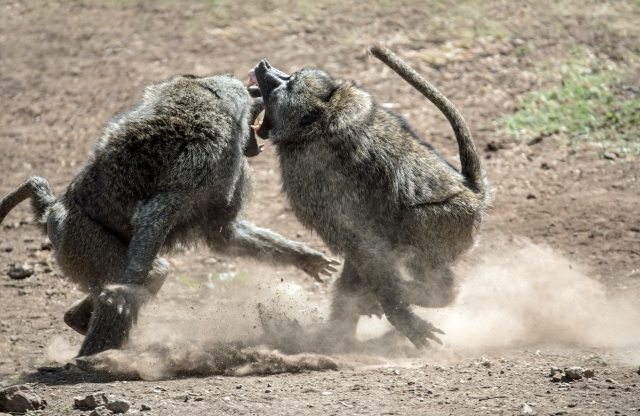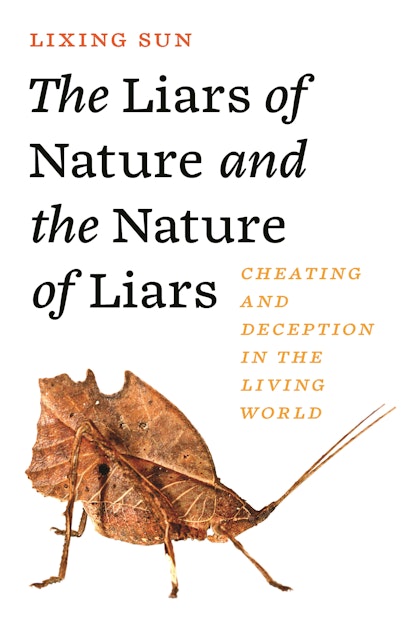Ever wondered why nonhuman primates have never built anything remotely close to a pyramid or the Great Wall? If your answer is that we humans are brainier by magnitudes, how come many social ants, bees, and wasps—dimwit as they may appear—can construct things far more impressive and inspiring than most primates can?
Take ants, for example. Working with tens of thousands or even millions of colony members, fire ants can huddle into a raft to survive in a flood, army ants can build bridges to let their colony comrades pass across abysses, and leaf cutter ants can cultivate fungal crops and practice agriculture of their own. By contrast, chimpanzees, our closest ape cousin, can only boast about sloppy beds for spending the night, stone tools for cracking nuts, or plant stems for fishing termites as their best feats. Intelligence, apparently, is overrated.
Why can some social insects carry out what nonhuman primates can’t? The answer lies in large-scale collaboration. With a collective diligence, these six-legged critters can wield swarm intelligence to achieve goals that no single individual can contend. These examples illustrate the potential power of large-scale collaboration, which is attainable mainly through shared genes to vindicate the veracity of the time-tested proverb: blood is thicker than water.
Why do brainier primates—baboons, macaques, nonhuman apes—fall short of producing anything that outshines what many social insects can do? And, more to the point, what is primate intelligence for?
Although genetic kinship works for primates too, its scope is far smaller, mostly confined within the boundary of a tribe. As group size in primates seldom exceeds a few hundred, shared genes are futile in forging a cross-group alliance large enough for a project like a cobble-stone road—not to mention an aqueduct or the Colosseum—that requires hundreds or thousands over many years. Since shared “blood” is off-limits for intertribal cooperation in primates, the only incentive to undertake a major project is through a shared interest across different tribes. Unfortunately, such a hypothetical incentive, as appealing as it sounds, is never practical for nonhuman primates. The reason: it falls victim to the prevalence of what is known academically as “tactical deceptions,” that is, cheating by exploitive manipulation, which is a primate proxy for disinformation.
Cheating is everywhere in nature. It’s something that fungi, plants, and animals all do. And even bacteria, viruses, and genes do it regularly. Cheating is so common in sophisticated animals, such as primates, that it has spurred the rise of social intelligence, a mental tool evolved for dealing with peers. Social intelligence, as you can see, is a double-edged sword that can be employed for both prosocial cooperation and antisocial manipulation.
There is no question that chimpanzees, baboons, and macaques are smart. They can share food, broker peace, cultivate friendships, build coalitions, or organize hunts. What then stops them from cooperating more broadly, to the point that they can work with members of other groups? The short answer is, paradoxically, they are too smart. Here is why.
For primates, society serves as a vehicle for individual success. And Machiavellian cunning is essential to get a competitive edge over other members of the group. Because certain members gain at the expense of others in most cases, social interaction is largely a zero-sum game with no tangible progress for the group as a whole. In this regard, chimpanzees, baboons, and macaques are too steeped in devising clever maneuvers to outfox their group mates to see that tactical deceptions can get their societies to nowhere but stagnancy. In other words, they are trapped by short-term individual gains by whatever means necessary, including all sorts of tactical deception. As a result, they smother the upward potential of intertribal, large-scale corporation.
Humans can be freed from this social trap by law enforcement and moral teaching, two means that we use to control rule violation, especially cheating in relentless pursuit of self-interests. With the downside of tactical deceptions contained, we are no longer stuck in the zero-sum game of manipulating our peers while trying to avert being manipulated by others. Social intercourse, thus, is transformed into win-win for all parties involved. Social intelligence, rather than used for outfoxing group members, is channeled toward finding common interests and seeking the benefits from endeavors that may require several tribes to take on. As a result, human societies thrive, and civilizations chug on. Here, extensive intertribal cooperation is a hallmark that separates humans from all other primates. Without the control of cheating, we humans might be unable to differentiate ourselves from other apes.
However, disinformation, albeit a new word, is an old phenomenon that has existed since time immemorial. It refers to malicious lies and deceptions that are fabricated for the interest of their creators and peddlers. Its peril is particularly pernicious in this digital age because vast numbers of innocent people can be hurt when information, misinformation, and disinformation can travel far and spread wide at an unprecedented speed. Take disinformation about COVID vaccines, for example. The mortality is over 14 times higher for those unvaccinated than those who have received two shots of vaccines. How many of our fellow citizens could have survived without the disinformation about the vaccines?
Disinformation, in addition to its harm to our personal lives, has an even far more-reaching risk: it shakes loose the foundation of democracy, as warned by many political leaders, thinktanks, and intelligence agencies. Indeed, on January 6, 2021, the US Capitol riot was fueled by the disinformation of an allegedly stolen election. Many participants were sent to prison without knowing they were the victims of the “Big Lie” at the time, thinking instead that they were patriots. Intriguingly, the same anti-democratic movement was repeated in the presidential election in Brazil just two years later, showing that disinformation is a dire, existential threat to all democracies in the world. Furthermore, disinformation sponsored by rogue governments has posed a new challenge to the integrity of our elections in addition to other social, political, and economic institutions and interests. It has awakened many from the dream of a globalized world, in which all peoples can live in peace and prosper together. These are some compelling reasons for why truth matters and why we should fight against disinformation at all cost, domestically and internationally.
While showing you a diverse range of interesting and enriching information about cheating in the biological world, including us humans, my research taps into the wellspring of evolutionary wisdom and lays out a blueprint for how to fight malicious, antisocial cheating that is, as we know now, essential for us to work together to deal with local, regional, national, and global challenges. I invite you readers to join this #TruthMatters movement to find new and creative ways to contain and control cheating in general and disinformation in particular.
Lixing Sun is Distinguished Research Professor in the Department of Biological Sciences at Central Washington University. He is the author of The Fairness Instinct: The Robin Hood Mentality and Our Biological Nature and the coauthor of The Beaver: Natural History of a Wetlands Engineer.

